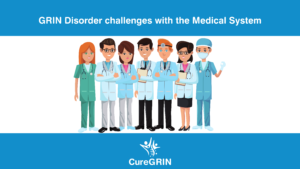L-Serine Trial Update
Share This Post
A recently published clinical trial found that a new treatment, L-serine, appeared to have some positive effects in a small group of children with GRIN Disorder. The researchers gave L-serine (at a dose of 500mg/kg/day) to a group of 24 participants (23 participants completed the study) for one year to determine if it was safe and improved functioning. The participants all had a GRIN loss-of-function variant (12 GRIN2B, 6 GRIN1, 5 GRIN2A), were between 2 and 18 years old (average age 9.8 years), and had symptoms like intellectual disability, behavioral challenges, movement disorders, and epilepsy.
Throughout the study, researchers assessed adaptive behavior (for example, communication skills and daily living skills), motor function, sleep disturbances, quality of life, seizure frequency, and electroencephalogram (EEG) results for the participants. They found that overall, L-serine (at the dosage used in the study) is a safe treatment for children with GRIN loss-of-function variants.
It is important to know the type of variant (gain-of-function or loss-of-function) because it determines how a receptor should be targeted with potential treatments. In the case of a loss-of-function variant, the goal is to increase the activity of the receptor. One way to do this is with an agonist, which is a substance that binds to the receptor and activates it. An example of an NMDAR agonist is L-serine. If the wrong type of drug or molecule treatment is given to a patient based on their functional testing, this could possibly make their symptoms worse.
The main goal of this study was to determine if the drug was safe (for example, if it causes side effects) and what the dosage could be. Future trials are necessary to further evaluate the ability of L-serine to improve functioning in a larger sample of participants and to assess how it compares to a placebo control group (which was not done in this study). This larger type of study could take several years to complete.
CureGRIN strongly recommends consulting with a physician before trying any new medicines or supplements.
You can learn more about the results of this clinical trial by reading the abstract here.
Reference: Juliá-Palacios N, Olivella M, Sigatullina Bondarenko M, et al. L-serine treatment in patients with GRIN-related encephalopathy: A phase 2A, non-randomized study. Brain. Published online February 21, 2024. doi:10.1093/brain/awae041
Written by: Melissa Finlay (CureGRIN Scientific Volunteer)
Edited by: Meagan Hutchinson (CureGRIN Research Manager)
Read more Posts

How I Became a GRIN Disorder Champion
Share This Post Share on facebook Share on linkedin Share on twitter Share on email Searching and Finding at the CFERV Conference on GRIN Variants

GRIN Disorder and the Medical System
We recently asked family members of the GRIN Disorder community about their concerns and challenges with the medical system.
